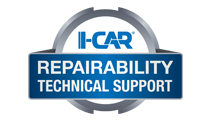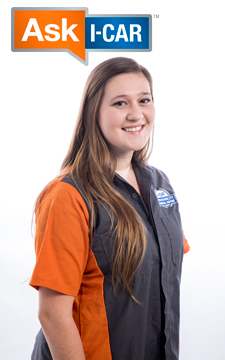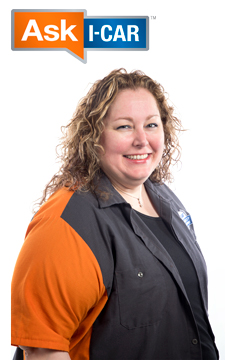I-CAR Audi Collision Repair And Electromechanical Repair Overview Courses
Posted on 25 November 2025I-CAR has developed courses that provide an overview of collision repair and electromechanical repair for current Audi vehicles.
I-CAR Repairers Realm: ADAS Calibrations After Wheel Alignment - Now Available
Posted on 5 March 2024I-CAR had a discussion on advanced driver assistance systems (ADAS) calibrations after a wheel alignment.
OEM Linking Pin: Wheel Alignment - Audi ADAS Clarification
Posted on 21 October 2021As part of the I-CAR Repairability Technical Support (RTS) OEM linking pin activity, we are helping to connect the collision repair industry to the vehicle makers. Recently, we had a technical inquiry on whether a wheel alignment is required before a system calibration can be performed. We reached out to Audi for clarification.
Audi Vehicle PR Numbers
Posted on 9 March 2021When looking up a vehicle on an OEM service information website, it is important to know as much about the vehicle as possible. Knowing what features or systems come equipped on a particular vehicle will help with the blueprinting and repair process.
Bumper Cover Repair With ADAS: Audi
Posted on 15 July 2020A simple bumper repair on a modern vehicle may not be as simple as it seems. New technologies like blind spot monitoring, adaptive cruise control, and other advanced driver assistance systems (ADAS) utilize sensors behind the bumper covers. The ability for these sensors to be able to see clearly, normally requires special caution when considering a bumper repair. Many OEMs have different levels of warnings when it comes to repairing bumper covers with ADAS. So, what does Audi say on the subject?
Refinishing Park Assist Sensors: Audi
Posted on 25 June 2020Park assist sensors are part of the park assist system, just one of many advanced driver assistance systems (ADAS) found on vehicles today. Damaged sensors are typically replaced and may require painting to match the vehicle. Vehicle makers often provide information on the painting of new sensors. Some vehicle makers do not recommend refinishing sensors with minor finish damage because excessive paint thickness may adversely affect the operation of the park assist system. However, other vehicle makers allow refinishing and provide guidelines. Let’s see what Audi has to say.
Audi Repair Manual: Driver Assistance Systems
Posted on 28 February 2020Advanced driver assistance systems (ADAS) have become a prominent part of the collision repair process. With this comes the need to efficiently locate what systems may be on a vehicle, and what calibration requirements to be aware of. To this end, Audi has made some changes to their service information.
Understanding The Rear View System
Posted on 5 February 2020A key part of being able to diagnose a problem with advanced driver assistance systems (ADAS) is understanding how the system works. Knowing what is happening inside the system will help you properly diagnose why the system may be failing. This will prevent replacing parts that are not causing the system issue. Let’s take a look at the inner workings of the rear view system.
Audi Position: Pre- and Post-Repair System Scanning
Posted on 27 March 2019We often receive the Ask I-CAR inquiry: "Does Audi have a position statement on pre- and post-repair system scanning? Do they plan on coming out with one?"
ADAS, Calibration, And Scanning Article Hotspot
Posted on 14 January 2019Since advanced driver assistance systems (ADAS), scanning, and calibration first started becoming relevant, members of the collision repair industry have required as much knowledge as possible on these subjects. I-CAR’s Repairability Technical Support (RTS) team continues to be on the leading edge of research and education. Our goal is to help communicate information to the industry, and a great way to do this is through Collision Repair News articles.
Locating ADAS Information: Audi
Posted on 5 September 2018As a collision repair technician, there is one part of a service manual that houses all of the information you would ever need…right? This is not the case with modern vehicles. You may be required to look in numerous manuals to find the information required to safely repair the vehicle.
Where Do I Find Other Types Of Information In Audi?
Posted on 24 April 2018Navigating OEM websites can be challenging when searching for collision repair procedures, especially as no two OEM websites are alike. What happens when you need to find other types of repair information, such as, "What needs to be inspected after a supplemental restraints system (SRS) deployment?", or "Does the tire pressure monitoring system (TPMS) require a scan tool or specialty tool?" Let's take a closer look at the Audi website.
Additional Calibration Requirements: Audi
Posted on 22 June 2017The addition of the OEM Calibration Requirements Search to the RTS portal was a big step for the collision industry. While this new feature has been well received, there has been some confusion about what is included in the search tool. The OEM Calibration Requirements Search is designed to provide information on the calibration requirements that are needed for vehicles equipped with advanced driver assistance systems (ADAS). This includes systems such as adaptive cruise control, lane keep assist, and collision braking.
Audi Glass Replacement Requirements
Posted on 4 October 2016The role of the windshield is a lot more complex than simply allowing a view of the road ahead. It is considered a structural part of the vehicle as it contributes to the strength of the roof and A-pillars. The windshield helps to manage collision energy and has become an integral part of several advanced safety systems.
Making Automatic Emergency Braking (AEB) A Standard Feature
Posted on 24 September 2015A group of vehicle makers got together recently and discussed the future of automatic emergency braking (AEB) technology in their vehicles. This feature is designed to reduce the severity and frequency of collisions; but no matter how good it is, it will never prevent all accidents from happening. So what do you need to know in order to repair vehicles with AEB, and how do you know the system is functioning properly?








